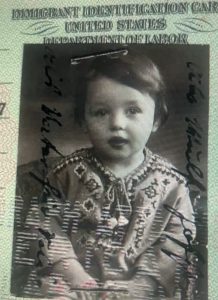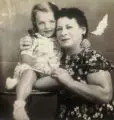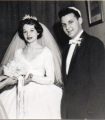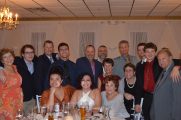- Local Survivor registry
- SELDI RUCHLIN
- Local Survivor registry
- SELDI RUCHLIN
Survivor Profile

SELDI
RUCHLIN
1937-PRESENT)
PRE-WAR NAME:
SELDE JOFFE
SELDE JOFFE
PLACE OF BIRTH:
BRESLAU, GERMANY
BRESLAU, GERMANY
DATE OF BIRTH:
AUGUST 24, 1937
AUGUST 24, 1937
LOCATION(s) BEFORE THE WAR:
BRESLAU, GERMANY
BRESLAU, GERMANY
LOCATION(s) DURING THE WAR:
WEST NEW YORK, NEW JERSEY
WEST NEW YORK, NEW JERSEY
STATUS:
CHILD SURVIVOR, REFUGEE
CHILD SURVIVOR, REFUGEE
RELATED PERSON(S):
ABEL JOFFE - Father (Deceased),
FRIEDA JOFFE - Mother (Deceased),
JOFFE, SONYA - Aunt (Deceased),
HAROLD RUCHLIN - Spouse,
ALAN RUCHLIN - Son,
GARY RUCHLIN - Son,
PAUL RUCHLIN - Son,
LISA HALPERIN - Daughter,
IAN RUCHLIN - Grandson,
KIRA RUCHLIN - Granddaughter,
LEAH RUCHLIN - Granddaughter,
BRENDAN RUCHLIN - Grandson,
CORY RUCHLIN - Grandson,
EVAN HALPERIN - Grandson
-
BIOGRAPHY BY seldi ruchlin AND LISA HALPERIN, DAUGHTER
Survivor Speech Delivered by Seldi Ruchlin, Pingry School, Warren, New Jersey (April 4, 2023)
Good morning. I want to tell you that I am really very nervous because this is not something I am used to doing. But I’m here to tell you my story of a Jewish child during the start of Hitler’s power. I was born in 1937 in Breslau, Germany, which is now in Poland. People always ask me what it was like to grow up there during that time, 1937 to 1939 when I was almost 3 years old. I couldn’t understand why people would ask that question. Why should it be different from yours – growing up in the United States? But when I think about it, I realize that once we came to the U.S. I was happy, and not fearful. So let me start from the very beginning.
My mother was born and raised in Germany and my father was born and raised in Russia. He joined the army and became a prisoner of war in Germany during WWI. My mother would pass the prisoner of war camp on her way to work and most of the time the prisoners were out in the yard. Somehow, they began a friendly relationship through the fence. She brought him food and things and they talked. Once the war was over and he was released, he found my mother and they began a romantic relationship. My mother got pregnant, but he didn’t marry her because she was not Jewish. My father went back to Russia. He told his parents all about his time in Germany, including my mother’s pregnancy. My grandfather convinced my father to go back to Germany, ask my mother to convert, marry her and raise their family. When he did, my mother’s family disowned her because she married a Jew.
Now it’s about 1919. My father started his own roofing business, they had bought a house and were living a good life. They had three children, my two brothers and sister. I was born in 1937, 12 years after my sister. Since Hitler was already in power, my Birth Certificate has the name Sara on it. All female Jews born had to have the name Sara on their Birth Certificate. I had a nurse maid, but then one day she was just gone. I don’t know why. I also noticed that I was not going to play with my friends as often. Things were just changing.
I remember seeing the arm bands with the Star of David on my siblings. It was just part of my life. We had to wear them whenever leaving our house. One day, while playing in my room, there was a POUNDING on the door. My mother came, grabbed me into her arms and told my brother to go to my father’s work and tell him to lock up and go hide. It was the Gestapo looking for him. This started happening more and more often. Then, one day, my father came home and told my mother it was time to leave because he realized that their friends and other Jews from the community were disappearing.
Fortunately, my father had two sisters who had left Russia years earlier and gone to the United States and lived in New Jersey. One of them, my Aunt Sonya, was politically active and was able to get passports for my whole family, which she had to pay for herself. So now we have passports and are on our way. Being about three years old, I thought we were going on an adventure. When we were getting on the boat, we were separated. Men and boys on one side and women and girls on the other. We only got together when we were able to go on deck. My father and I would sit together and sing songs.
We landed in New York and went to live in New Jersey in an apartment building. I had never seen an apartment building before. All I remember about living in the United States was how happy I was. I didn’t feel afraid anymore! In Germany, I was always afraid. I thought it was how everybody felt. All I can say is – How lucky were we? Thank you. God bless you and the United States of America.
My mother’s Story By Lisa Halperin, Daughter
My mother was too young to remember a lot, which I think I am grateful for. Her siblings, especially her brothers who were young men at the time, I’m sure went through more physical and emotional hardships than she did. Neither of her brothers or her sister are alive, and I have lost the opportunity to talk to them about their experiences and what they remember. As I’ve put the timeline together in my head, I realize that they were in Germany for Kristallnacht (November 9-10, 1938). My grandfather had a business, probably a storefront which would have certainly been destroyed on that terrible night. They were all amazingly fortunate that the entire family were granted visas and that they were able to get to the United States together, just one month after Kristallnacht. If that had not happened, and it did not happen by accident, there are many scenarios that might have occurred, none of them good. She and her family would have likely been relocated to a ghetto. If they survived that, they likely would have eventually been sent to a concentration camp. The reality of that is that most of the children her age that were sent to concentration camps were killed as soon as they got there. The Nazi’s had no use for children. But my mother is right here – so she is a survivor. She escaped. She went on to have a wonderful life. She has four children and six grandchildren. She taught us all to be kind, loving, tolerant people, despite being born into a world of hate and intolerance.
Editor’s Note: Refer to Lisa Halperin, Voices of the Descendants Testimony ” Discovering My Mother is a Survivor.”
-
SURVIVOR INTERVIEW:
Date: November 29, 2023
Location: SSBJCCHEC Phone Interview
Interviewer Nancy Gorrell
Q: Who were your siblings and did they all come to American with you?
A: I had two brothers and one sister. The oldest was Joseph Joffe, then David Joffe, and then my sister, Judy Joffe. My brothers came here as teenagers. We all lived together in West New York, New Jersey.
Q: Your father was taken before Kristallnacht. Do you know the name of the camp he was sent to?
A: I have no idea where they took him. No one ever talked about it. He served Germany in WWI. I don’t know how long it was before he was released.
Q: Did your parents ever talk to you about extended family or relations that were unable to get out of Breslau, Germany, or perished?
A: My mother’s family wasn’t Jewish so they survived. My father’s family was in Russia during the war. I know one of his brothers [insert name here] left Russia and went to Israel. His three sisters came to New York. Sonya, one of his sisters arranged sponsorships for us to go to America. It wasn’t easy. Sonya had political friends who got us passports.
Q: Once in America, what are your memories of the war years from 1938-1945? How did you spend them in West New York, New Jersey?
A: I have memories of when we used to have the blackouts which was very, very, scary of course. We went and covered all the windows, turned out the lights and blewout the shabbos candles if it was shabbas. Then we waited for the all-clear siren. Blackouts lasted until the war was over.
Q: What was your post-war life like? Describe your education, schooling, and friends? West New York was a combination of Jews and Italians, mainly.
A: I had a lot of Italian friends and some Jewish friends. My mother was not in favor of me going to Hebrew school. It was important for me to learn how to be a housekeeper who cooks and cleans and takes care of the family. I went to grammar school and high school but not college. They didn’t have the money to send me and my parents didn’t believe it was necessary for a girl to further her education.
Q: What about your brothers? Did they go to college? A: My brothers went into the service during the war. Then when they returned, they went into my father’s business which was roofing and tinsmith work. That is what they did.
Q: Did you celebrate holidays? Did you go to synagogue?
A: I went to synagogue with my father on holidays. My father went every week, but I went just on holidays.
Q: How did you meet your spouse, Harold Ruchlin?
A: I met Harold when we were both 13 in Sharetsedek synagogue on Roshashana. He was in the choir on the bimah. I was upstairs in the balcony, looked down at the choir and our eyes met. That was it! We got married February 14, 1959. We were both 21 years old. I’d like to tell a little side thing. When we came over, I was just three years old. When we moved into the apartment, my father wanted to take me to see the synagogue. When we went in, Harold’s father greeted my father. Then he saw me. He pinched my cheek and he said, “She going to marry my son!”
-
Sources and Credits:
Credits:
Biography by Seldi Ruchlin and Lisa Halperin, daughter.
SSBJCCHEC Survivor Interview (November 29, 2023) with Seldi Ruchlin; Interviewer: Nancy Gorrell
Historic and family photographs and documents donated by Seldi Ruchlin and Lisa Halperin, daughter.
Acknowledgements:
SSBJCCHEC acknowledges with gratitude donation of historic and family photographs and documents from Seldi Ruchlin and Lisa Halperin, daughter.








